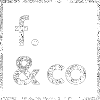21. Repeat
In his book Outliers, Malcolm Gladwell hypothesizes that the key to success follows "the 10,000 hours rule". What that means is that successful individuals in any field must have practiced a specific task during more or less 10,000 in order to manifest true genius. Whether or not Gladwell's hypothesis may be confirmed is not for us to decide. Not here. But an urban tale hints at an answer:
Picasso was sitting in a Paris café when an admirer approached and asked if he would do a quick sketch on a napkin. "I'll pay whatever you want", said the woman. Picasso agreed, executed the work, and handed back the napkin. "That'll be 10,000 Francs", he said. The admirer was shocked "How can you ask for so much. It took you a minute to draw this". "No", Picasso replied, "it took me 40 years to get here".
Nonetheless, we tend to focus solely on the obvious manifestations of creativity that shine in full view. We do so all the time. As John Seely Brown and Paul Duguid wrote about technical repairmen at the source of some of Xerox's most inventive products of the last decades, the sparks of creativity lie between communities. In a instant, a blitz, a bang.
As fascinating as these moments of creativity may be, they are – we have spent significant time exploring that – always recounted after the fact. They are told, like stories, narratives which proceed to rationalIze ex post facto. As great as this is to make a compelling case for an idea, a brand or a person, it most often obliviates the true facts about creativity. The failures, the tears, the sweating and the swearing. Creation is not a moment, but a movement. A lasting action based on search and research.
A Creative Director at Disney Imagineering, Luc Mayrand has been working at his current project for several years. The trick, he says, is that with time, you have the opportunity "to use every trick in the book". To try different things. And in the process, to define new standards for new grounds, to develop a new worldview for markets untouched by competitors. This is how the flag is planted in the middle of the blue ocean of contemporary business. But these things do not happen in a moment. They are not a matter for instants.
A similar point is made by Ubisoft's senior producer Stéphane Cardin. In his "Fail fast, follow the fun", the notion of repeated experiments is a condition for success. In this, the project evolves, and the novelty thus developed will constitute a new meaningful universe in the video-game industry. At one point, an announcement will be made. A flag will be planted. But in matters of timing like this one, we cannot abide by our obsession for the momentaneous tingling of the neocortex. It has been, and will be, a matter of repeated creation.
This text is part of a series written in the context of the Fifth edition of the Montreal-Barcelona Summer School on Management of Creativity, organized by Mosaic HEC Montréal and Universitat Barcelona, July 9 to 24, 2013.
Illustration by Studio 923a. Read all posts in the series at blog.fandco.ca/yulbcn.


